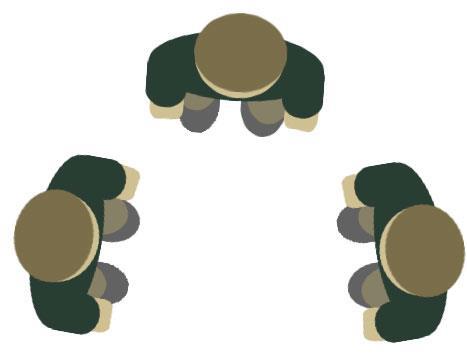Networking is important for both employee and business development, but it’s no secret that most people hate doing it.
Connecting online is so easy. Sadly in life, when you’re faced with a room full of people, there’s no ‘connect’ button to hide behind. But the magnetism that comes from having a human, face-to-face conversation with someone who was once a stranger cannot be replicated by a click, and is less likely to be forgotten.
Here are some top tips to share with employees attending a networking event:
1. Who to talk to
When arriving at a social or networking event you should pluck up the courage and do something your mum told you never to do… talk to strangers!






Look around and you’ll usually see these six different ‘groups’ forming:The singlesThe ‘open’ twoThe ‘closed’ twoThe ‘open’ threeThe ‘closed’ threeThe fours and mores
By far, the easiest people to approach are the people standing on their own. Nobody goes to a social or networking event with the aim of standing in a solitary corner – help them out! Start with ‘Do you mind if I join you?’ and take it from there…
The next best group is the ‘Open two’. Closed groups and larger groups can be harder to approach, and may be less open for interruption, unless you recognise someone who can ease your entry into the group.
2. What to ask
A lot of people have an issue with networking in the traditional sense because it feels awkward. Nobody wants to speak to someone who is only making conversation with them because they feel like they should.
Networking, done right, doesn’t have to be that way. And it starts with you. When you strike up a conversation with a stranger, you’ve got a unique opportunity to learn and explore topics and points of view that you’d never have thought of before. Ask questions, seem genuinely interested, and before long, you will be. As with most human interactions, this curiosity will be reciprocated.
Not sure what questions to ask? Here’s some great open ended questions to engage people at networking events:
- What’s your area of expertise?
- How did you get started in what you do?
- What do you do when you’re not working?
- What’s the most exciting thing you’re working on at the moment?
- What are your plans for the next… ?
3. Responses that you need to prepare for
Experts suggest that ‘What do you do?’ and ‘How’s business?’ are by far the two most common questions asked in networking events. And I’m sure you probably ask these questions yourself.
The trouble is, if you’re like most people you also make up answers to these questions on the spot each time. But if you’ve thought ahead about how you might answer these questions you’ll naturally respond more confidently, in a way that opens up further opportunities to engage and interest the other party.
Avoid telling them in any detail about what you do but perhaps have an engaging story or parallel about what you do – perhaps about a recent piece of work or service that worked out really well for a client.
4. Make it personal
It’s one of the quickest ways to build trust. And trust is going to be crucial in getting people to want to work with you, or recommend you. Start with the obvious stuff, hobbies, children, holiday destinations, anything non-business related. This often softens and relaxes people and will make it feel like you’re actually getting to know one another rather than just networking.
5. Take 2 minutes to follow-up, within 3 days
So you’ve done a great job at shaking hands, exchanging pleasantries and business cards which are now somewhere in the pocket of that jacket… you think.
Amazingly, it’s estimated around 80% of the time, leads from networking events are never followed up. Try not to make this mistake. It’s far too easy to get back to the office and get back to ‘work’ but this is the key reason why many networkers claim that networking doesn’t work for them.
Take a couple of minutes to drop them a quick email as soon as possible with a link to that interesting article you were discussing, go ahead and press that ‘connect’ button on LinkedIn, even give them a quick call.
If you want something to come of your efforts, take the time to cement your acquaintance. When following up remember three rules:
- Respond quickly
- Add value immediately
- Play the long game
If you’re looking for a new client, unless you get lucky, they probably won't buy or refer you immediately. But you have to move quickly and get the long game underway. You're continuing to build the business relationship you started at the networking event. Think what you can do, give, share, offer or introduce them to that will be of value for them and easy for you. Good networking is good relationship building and hopefully when they need some help they’ll remember you.
Is it really so bad?
It’s not a surprising fact that 85% of people say they build stronger, more meaningful business relationships during in-person business meetings and conferences.
No software solution can replace the benefits that human interaction brings to business. You never know just what one conversation could spark – an important new supplier or a big new client? So why not encourage employees to book themselves into relevant events they’re passionate about. If they’re armed with these tips they’ll stand a much better chance of making it work for them and the business.
This content originally appeared on Benenden’s workplace hub where employers can find a range of related articles to help with their health and wellbeing strategy.











